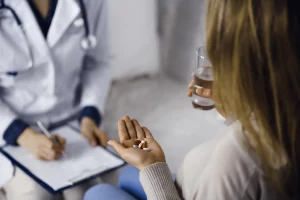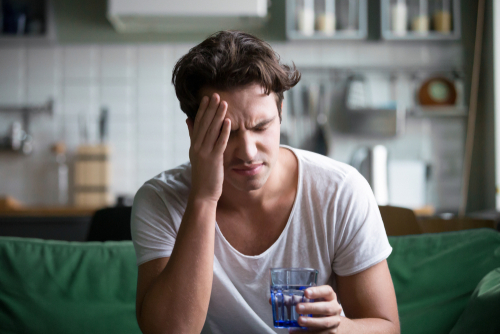Opioid addiction is a serious and complex condition affecting millions worldwide. Opioids, also known as narcotics, are a class of drugs that include prescription painkillers like oxycodone, hydrocodone, and fentanyl, as well as illegal drugs like heroin. Opioids are highly addictive and lead to physical dependencies.
Detoxification is a process that helps individuals safely and effectively withdraw from opioids. Detoxification can be done in a medical setting, such as a hospital or detoxification center, or at home under medical supervision. Detoxification aims to manage withdrawal symptoms and safely rid the body of opioids. Detoxification is the first step towards recovery from opioid addiction and can be a crucial component of a comprehensive treatment plan.
This article discusses the benefits of medically-assisted detox and what comes after.

What Is Medical Detoxification?
Medical detoxification is a supervised process involving medication to manage the side effects of opioid withdrawal. Medical detoxification is typically conducted in a hospital or detoxification center, where medical professionals can monitor patients’ vital signs and provide support as needed. It can also be carried out at home with the assistance of healthcare professionals.
The medication used in medical detoxification depends on the individual’s needs and medical history. Methadone, buprenorphine, and naltrexone are commonly used medications to manage opioid withdrawal symptoms. Methadone and buprenorphine are opioid agonists, which means they bind to the same receptors in the brain as opioids and can help reduce withdrawal symptoms while blocking the effects of other opioids. Naltrexone is an opioid antagonist which blocks the effects of opioids and can help prevent relapse.
How Long Medical Detox Last?
Medical detoxification typically lasts a few days to a week, depending on the individual’s needs and the severity of their addiction. During this time, medical professionals monitor the individual’s vital signs, administer medication as needed, and provide support and counseling to help with the withdrawal process. Medical detoxification is often followed by a longer-term treatment plan that may include medication-assisted treatment, therapy, counseling, and support groups.
Problems With Non-Medical Detox
Non-medical detoxification for opioids involves withdrawing from opioids without medication-assisted treatment. There are two main non-medical detoxification methods: cold turkey detox and tapering off.
- Cold turkey detox involves stopping the use of opioids abruptly and enduring the withdrawal symptoms without medication. This method can be challenging and uncomfortable, as withdrawal symptoms can include nausea, vomiting, diarrhea, muscle aches, insomnia, and anxiety.
- Tapering off involves gradually reducing the dosage of opioids over time until the individual is no longer using the drug. This method can help manage withdrawal symptoms and make detoxification more manageable. However, sticking to a tapering schedule can also be challenging, and the risk of relapse may be higher.
Non-medical detoxification is often not recommended for individuals with severe opioid addiction or those with a history of seizures, heart problems, or other medical conditions that the withdrawal process could worsen. It is essential to consult a medical professional before attempting non-medical detoxification, as the withdrawal process can be dangerous if not properly managed.

Why Support Is Important During Detox
Support during detoxification is crucial to managing withdrawal symptoms, reducing the risk of relapse, and improving the individual’s overall well-being. Therapy, counseling, and support groups can provide emotional and social support during detoxification.
Therapy and counseling can help individuals identify and address the underlying issues that led to opioid addiction. Cognitive-behavioral therapy, in particular, is effective in treating opioid addiction by helping individuals develop coping strategies to manage cravings and avoid relapse.
It’s important to seek support during detoxification through therapy, counseling, or support groups. Support can help you better cope with the physical and emotional challenges of withdrawal and provide you with motivation and encouragement to continue with long-term treatment.
Risks & Side Effects Of Detoxification
Detoxification can be challenging and uncomfortable, and risks and side effects are associated with it. The most common side effects of opioid withdrawal include
- Nausea
- Vomiting
- Diarrhea
- Muscle aches
- Sweating
- Chills
- Insomnia and fatigue
- Changes in appetite and weight loss
Psychological symptoms can also occur during detoxification, including
- Anxiety
- Depression
- Irritability
- Mood swings
These symptoms can be challenging and may require additional support and treatment.
In some cases, more severe side effects may occur during detoxification, including seizures, hallucinations, and delirium tremens (DTs). DTs are a severe form of withdrawal that can cause confusion, agitation, and potentially life-threatening seizures.

Follow-up Care After Detoxification
After detoxification, it’s crucial to continue with follow-up care and treatment to maintain sobriety and prevent relapse. Treatment may include medication-assisted treatment, therapy, counseling, and support groups. Here are some strategies that can help with relapse prevention:
- Therapy and counseling: Cognitive-behavioral therapy and other forms of therapy can help individuals develop coping strategies to manage cravings and avoid relapse.
- Support groups: Support groups can provide a sense of community, understanding, motivation, and encouragement to continue with long-term treatment.
- Healthy lifestyle: Maintaining a healthy lifestyle that includes regular exercise, a balanced diet, and adequate sleep can help improve overall well-being and reduce the risk of relapse.
- Avoiding triggers: Individuals should identify and avoid triggers that may lead to relapses, such as certain people, places, or situations associated with drug use.
- Developing a relapse prevention plan: It can be helpful to develop a plan that includes strategies to manage cravings and triggers and a plan of action in case of a relapse.
Contact MD Home Detox
Our at-home detox services are the perfect solution for those struggling with opioid addiction. We understand how difficult it can be to seek help, so we bring the detoxification process to you in the comfort of your home. Contact MD Home Detox in Los Angeles to learn more and register for our at-home detox services.

